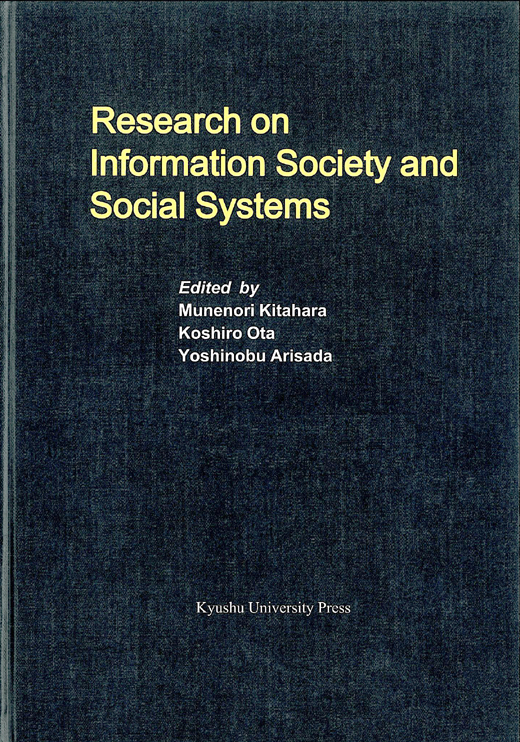- HOME >
- BOOKLIST >
- Social sciences>
- Research on Information Society and Social Systems
Research on Information Society and Social Systems
Introduction
Contents
Preface
Part1 Research on Information Society
Chapter 1
The Information Technology and the Ethical Use Munenori Kitahara
1. Introduction
2. Absolute Security and Relative Securiy of Technology
3. Information Technology and the Defects
4. Defective Technology and Ethical Use
5. Information Accidents
6. Information Ethics and Morals
7. IP Technology and Ethical Deed
8. Conclusion
References
Chapter 2
A Critical Study on Asymmetric Regulation or the Mandatory Sharing of
Facilities in the Telecommunications Industry Koshiro Ota
1. Introduction
2. The Telecommunications Act of 1996
3. Asymmetric Regulation
4. The Antitrust Laws(Essential Facilities Doctrine)
5. The Performance of the 1996 Act or the Enforcement Rules
6. A Critical Study of the Enforcement Rules
7. Conclusions
References
Chapter 3
A Note on Key Escrow Using Yaksha Scheme
Toru Inoue and Kouichi Sakurai
1. Introduction
2. Kerberos System
3. Yaksha System
4. To Improve Yaksha So Far
5. Proposal of S.Miyazaki et al.
6. A Proposal for Improvement of Yaksha System
7. Concluding Remarks
References
Chapter 4
The Impact of Open Source Software on e-Government Development
and Deployment Naoko Wakiya, Shiro Takashima and Mitsuru Ohba
1. Introduction
2. Impact of Open Source Software
3. OSS Impact on e-Government
4. Implication of OSS
5. Conclusion
References
Part II Empirical Analysis on Social Systems
Chapter 5
Estimation of Structural Fiscal Balance Kazunori Morioka
1. Introduction
2. Meaning of Structural Fiscal Balance Estimate
3. Measurement of Potential Gross Domestic Product
4. Measurement of the Structural Fiscal Balance
5. Conclusion
References
Chapter 6
Income Risk, Demographic Risk and Intergenerational Risk Sharing
Effects of Social Security Jun-ichi Maeda
1. Introduction
2. The Model
3. The Defined Contribution Wage Indexation
4. The Defined Benefit Wage Indexation
5. The Comparison of Two Systems
6. Conclusion
References
Chapter 7
Evolutionary Games and Oligopoly Market Yoshinobu Arisada
1. Introduction
2. Nodel
3. Imitation and Evolutionarily Long-run Equilibria
4. Instinct and Evolutionarily Long-run Equilibria
5. Conclusion
References
Chapter 8
Managing the Supply Chain Process of the International Cooperative
Global Complementary Production Systems Shusaku Hiraki
1. Introduction
2. Supply Chain Process of the ICGCPS
3. Transportation Model Considering Overseas Markets
4. Production and Transportation Planning Procedure
5. The Effects of Shortening the Transportation Lead-time
6. Conclusion
References
Chapter 9
A Study on Designing of a Reverse Logistics System for Reusable Packing
Materials Yuanming Su and Shusaku Hiraki
1. Introduction
2. Reusable Packing Materials Reusing System
3. Conditions
4. Formulation
5. Numerical Example
6. Conclusion
References
Chapter 10
Multiobjective Optimization by Improved NSGA-II with Extended Crossover
and Uniform Distance Selection Setsuko Sakai and Tetsuyuki Takahama
1. Introduction
2. Multiobjective Optimization Problem
3. Multiobjective Evolutionary Algorithms
4. NSGA-II with Extended Crossover and Uniform Distance Selection
5. Experiments
6. Conclusions
References
Chapter 11
A Probability of Alternative Paths in Schedule Management
Seijiro Hiromitsu
1. Introduction
2. PERT and its History
3. Probability of Alternative Paths
4. Numerical Examples
5. Conclusions
References
Author
Munenori Kitahara
Faculty of Economic Sciences, Hiroshima Shudo University
(Chapter 1)
Koshiro Ota
Faculty of Economic Sciences, Hiroshima Shudo University
(Chapter 2)
Toru Inoue
Faculty of Economic Sciences, Hiroshima Shudo University
(Chapter 3)
Kouichi Sakurai
Faculty of Infomation Science and Electrical Engineering, Kyushu University
(Chapter 3)
Naoko Wakiya
Faculty of Economic Sciences, Hiroshima Shudo University
(Chapter 4)
Shiro Takashima
former, Ministry of Internal Affairs and Communications
(Chapter 4)
Mitsuru Ohba
Systems Engineering Dept., Hiroshima City University
(Chapter 4)
Kazunori Morikawa
Faculty of Economic Sciences, Hiroshima Shudo University
(Chapter 5)
Jun-ichi Maeda
Faculty of Economic Sciences, Hiroshima Shudo University
(Chapter 6)
Yoshinobu Arisada
Faculty of Economic Sciences, Hiroshima Shudo University
(Chapter 7)
Shusaku Hiraki
Faculty of Economic Sciences, Hiroshima Shudo University
(Chapter 8, 9)
Yuanming Su
Graduate school of Social Sciences, Hiroshima University
(Chapter 9)
Setsuko Sakai
Faculty of Economic Sciences, Hiroshima Shudo University
(Chapter 10)
Tetsuyuki Takahama
Faculty of Information Sciences, Hiroshima City University
(Chapter 10)
Seijiro Hiromitsu
Deoartment of Economic Informatics, Hiroshima Shudo University
(Chapter 11)


